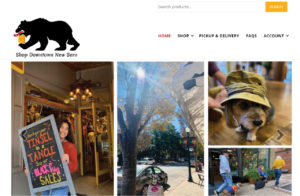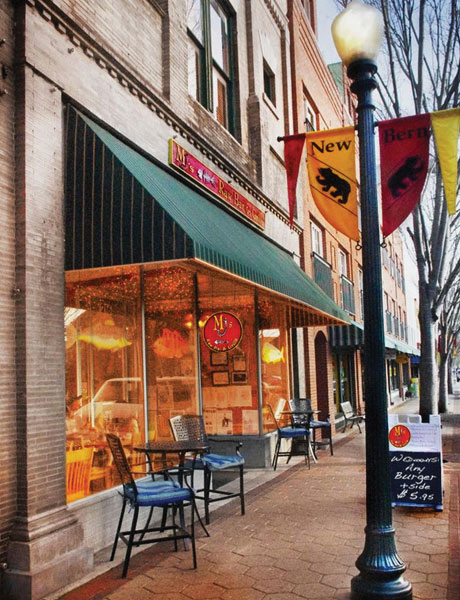What started as a creative COVID solution now promises to support local businesses far into the future.
Faced with a potential crisis for their local economy, the City of New Bern and their Main Street organization launched a multi-approached strategic plan designed to provide local financial support.
From that work came an innovation that will far outlive social distancing: an e-commerce site for small businesses, Shop Downtown New Bern, that serves as an online shopping hub for any local business that wants to participate.
“It was a tool to help businesses survive,” said Lynne Harakal, executive director of Swiss Bear, New Bern’s Main Street accredited organization.
To understand the impact of this project, it’s important to recognize that many of the storefronts lining downtowns and city centers across North Carolina are only that—storefronts. The business model doesn’t always expand elsewhere, not even online. For a number of downtowns, pre-pandemic, it didn’t need to. The shops and small businesses both drive and benefit from foot traffic, and that defines the mutually prosperous relationship between the town and the store.
COVID-19 altered that equation. With downtowns largely empty and in-person shopping mostly unavailable, business threatened to dry up, leaving a once-blossoming Main Street in disrepair.
Harakal saw this problem developing in plain sight. The pandemic didn’t mean these shops and businesses weren’t still providing items and services in demand—it just meant that they were harder, if not impossible, to reach. The gain of the box store was the loss of the corner shop.
“You have Walmart in particular,” Harakal said. “They were able to remain open, and people were going in droves to do grocery shopping and pick up kids supplies—things that they needed. When we looked up what our downtown businesses offered, we have many of the same thing that Walmart had. It’s just that it wasn’t a one-stop single destination.”
 Swiss Bear took the lead on the e-commerce project, though the relationship between the municipality and the economic development organization is thoroughly intertwined. A close partner of the city and one of the oldest Main Street accredited organizations in North Carolina, the two entities were no stranger to working together. Operating in sync throughout 2020, this arrangement resulted in a loan fund for local businesses, planning for on-street dining and outdoor activities in town, and a re-imagined MumFest—an annual festival that stands as New Bern’s biggest economic boon each year. Normally held in the fall, city leaders transitioned the event last year to cover all of October and to feature extended dining hours in the downtown streets. For one year only, MumFest was better known as “MumFeast.”
Swiss Bear took the lead on the e-commerce project, though the relationship between the municipality and the economic development organization is thoroughly intertwined. A close partner of the city and one of the oldest Main Street accredited organizations in North Carolina, the two entities were no stranger to working together. Operating in sync throughout 2020, this arrangement resulted in a loan fund for local businesses, planning for on-street dining and outdoor activities in town, and a re-imagined MumFest—an annual festival that stands as New Bern’s biggest economic boon each year. Normally held in the fall, city leaders transitioned the event last year to cover all of October and to feature extended dining hours in the downtown streets. For one year only, MumFest was better known as “MumFeast.”
“MumFest usually brings in about 100,000 people over the weekend,” said Harakal. “But the majority of our businesses—about three quarters of them—had a better October in 2020 than they did in 2019.”
With that local government support entrenched, Swiss Bear began the e-commerce project by applying for a grant from the Grills Fund, which was rewarding Main Street organizations nationwide that were seeking COVID-19 innovative solutions. New Bern was one of eight grant winners.
The project then operated under the working title, the Bear Towne Marketplace, as a direct response to the problem Harakal and New Bern identified in the tension between downtown and Walmart: ease of access. “The Bear Towne Marketplace will provide a digital one-stop shopping platform that will help Downtown New Bern retailers reach customers during recovery and well into the future,” read Main Street’s announcement of the grant winners. Ultimately, they settled on the name Shop Downtown New Bern, or shopdowntownnewbern.com.
 They began by engaging stakeholders. Through several focus groups of local businesses, Harakal and Swiss Bear proceeded to gather specific issues and hurdles that local businesses were facing, while at the same time working to make business owners more comfortable with this new idea. They learned the full catalog of downtown offerings, and drafted plans to organize the site to best categorize all the available items. That led to a first draft, then more focus groups, then tweaks, and then more meetings with store owners.
They began by engaging stakeholders. Through several focus groups of local businesses, Harakal and Swiss Bear proceeded to gather specific issues and hurdles that local businesses were facing, while at the same time working to make business owners more comfortable with this new idea. They learned the full catalog of downtown offerings, and drafted plans to organize the site to best categorize all the available items. That led to a first draft, then more focus groups, then tweaks, and then more meetings with store owners.
Next, they got the businesses online. Through persistent outreach, Harakal and the Swiss Bear staff walked the business owners through the process of uploading items, descriptions, pictures and prices. Each participating store has their own login, which allows them to manage their inventory as needed.
“Honestly, there was so much uncertainty that the businesses jumped on board because they were looking for any solution to help,” Harakal said.
Offline, Swiss Bear finalized two critical administrative pieces. First, where would the items be picked up? Working with a partnering business just outside of downtown, they were able to secure a regular pickup spot with excess parking. After a customer buys an item from a store—or from several stores—they’ll be alerted when their items are ready for pickup. If they need the items to be shipped, Swiss Bear handles that, too.
Second, they streamlined payment, both from the customer and to the owners. There is a single checkout for the buyers, and Swiss Bear then funnels that money back to the sellers. They also pay the monthly state sales tax on behalf of the businesses.
After winning the grant in May 2020, the website was operational and with 25 businesses involved by the end of the year. Through partnerships, it was done for less than $10,000, and leftover funds have gone towards reducing shipping costs and marketing the site.
Overall, the project has been successful, and in some unanticipated ways. Online business has been steady since it launched, says Harakal, and the lifeline extended to some of these shops may have kept them afloat. What was not expected, however, was how it would impact in-person shopping once COVID precautions relaxed.
“What’s been remarkable is that we’ve had feedback from our businesses that the items that have been listed have been moving off the shelf faster, in the store,” said Harakal. “It’s almost like people are using it to see what’s available.”
It’s that result that shows the staying power of this program, and neither the City nor Swiss Bear expect this initiative to fade away any time soon. In fact, introducing long-term online support was a foundational piece of the original idea, as it provides the community’s central business with another tool to thrive in the increasingly digital marketplace.
“People want to help (their local businesses), but they also have to get what they need,” Harakal said. “I would really encourage other towns to undertake something like this.”
This article was written by the North Carolina League of Municipalities in partnership with Hometown Strong and UNC’s Homegrown Tools.














